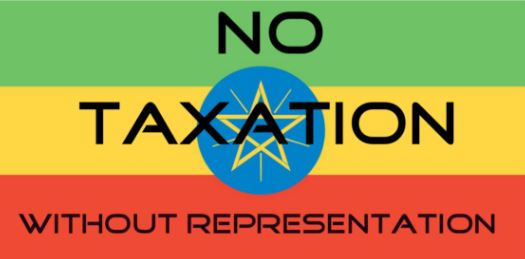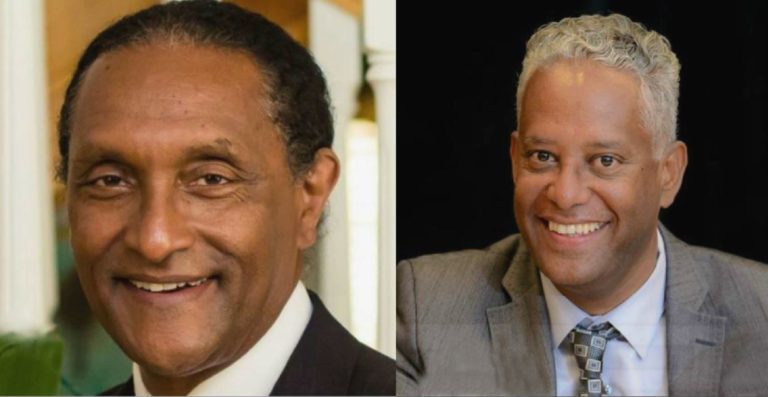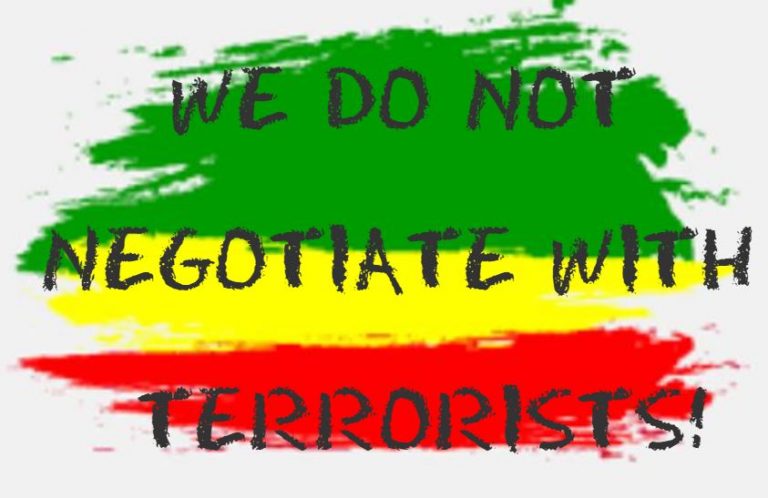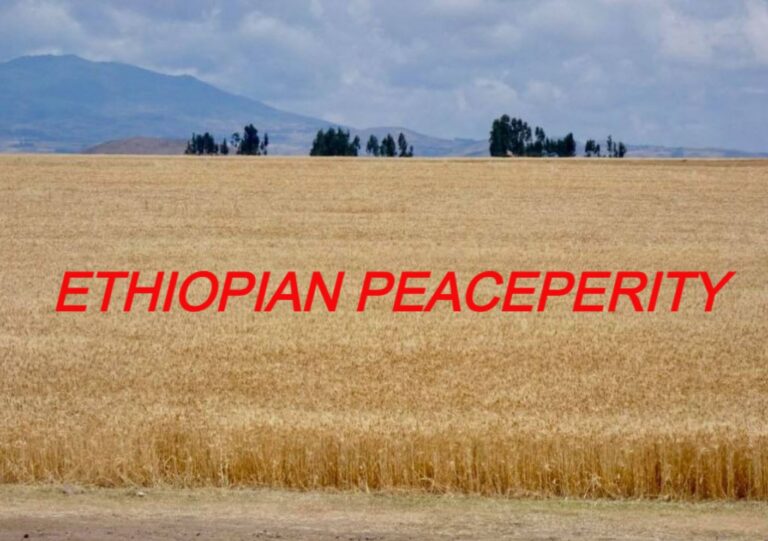Obama came and saw but did he conquer Africa?
Alemayehu G Mariam
 (This week my regular Monday commentary is presented for the second time in the form of a “flash drama” on Obama (a sub-genre of theatrical play sometimes described as a “ten minute one-act play”). The first “act” of this “flash drama” was presented in my June 23 commentary, “Obama is Coming! Obama is Coming to Africa!!”
(This week my regular Monday commentary is presented for the second time in the form of a “flash drama” on Obama (a sub-genre of theatrical play sometimes described as a “ten minute one-act play”). The first “act” of this “flash drama” was presented in my June 23 commentary, “Obama is Coming! Obama is Coming to Africa!!”
The scene in the second act is a neighborhood tearoom somewhere in Africa. The two young African college friends two weeks later have a chance meeting. Their conversation shifts from the critical health condition of President Nelson Mandela to President Obama’s departure from Africa after he completed his “Africa Visit”. (I have opted to use “flash drama” to add creative range to my commentaries and expand my reach to the younger generation of Ethiopians and other African youth. The names of the characters have special meaning.)
Act I: Obama is Coming! Obama is Coming to Africa!!
Act II:
…
Duma: I am worried sick Mandela is sick.
Shudi: I just wonder what will happen to South Africa after Mandela is gone.
Duma: The same thing that will happen when the father of any family is gone.
Shudi: You mean there will be some family feud, discord and falling out…
Duma: But the family will survive. The South African family is strong.
Shudi: The Spirit of Mandela will keep the family together!
Duma: And guide South Africa as it always has.
Shudi: Guide the conscience of South Africans.
Duma: And their hearts and minds too.
Shudi: Mandela may be gone but his Spirit will live forever!
Duma: Africans say, “A good chief is a reward of God.”
Shudi: South Africa has been blessed!
Duma: “Nkosi Sikelel’ iAfrika” (God bless Africa.)
Shudi: Obama has come and gone…
Duma: Obama came and saw but did he conquer?
Shudi: He came. He saw. He left.
Duma: Back to the U.S. of A?
Shudi: Where else?
Duma: Ethiopia? Nigeria? They are America’s best partners in Africa.
Shudi: Not even Kenya! He says he’s “got three and half years to come back to Kenya.”
Duma: Hope he had a better reception than his first Africa visit in Accra, Ghana in 2009.
Shudi: Someone told him in Soweto, “the euphoria that engulfed this continent when President Obama was elected is fading.”
Duma: Yeah! The thrill is gone with the Obama drama.
Shudi: He visited three countries in one week, you know.
Duma: What’s up with that? Is he making campaign stops?
Shudi: With all the promises and pledges he made, you could say he was stumping.
Duma: He is the best at making promises.
Shudi: And not keeping them?
Duma: And breaking them. What did he promise this time?
Shudi: Everything!
Duma: Everything?
Shudi: He promised to “launch a new program that’s going to givethousands of promising young Africans opportunity to come to the United States and develop their skills at some of our best colleges and universities.”
Duma: Too little, too late!
Shudi: What do you mean?
Duma: China has already snatched 12,000 young Africans.
Shudi: Promising ones?
Duma: The crème de la crème.
Shudi: What about the millions of not-so-promising young Africans?
Duma: They are on their own.
Shudi: Promises only for promising young Africans in the Promised Land?
Duma: But it’s all promises. Don’t mean nothing.
Shudi: What do you mean?
Duma: How many promises has Obama made?
Shudi: Too many?
Duma: How many has he broken?
Shudi: Too many.
Duma: Ever heard of the “talented tenth”, Shudi?
Shudi: No. What’s that?
Duma: It’s an old idea about one in ten black men becoming leaders of their race in the world and solving the “The Negro Problem”.
Shudi: How?
Duma: Through education, entrepreneurship, scholarship and direct involvement in social change.
Shudi: Talented tenth for the “African Problem”?
Duma: Bring the most promising young Africans to America and teach them about “civic leadership and public administration and business and entrepreneurship”.
Shudi: And solve the “African Problem”?
Duma: With the help of the “connections” they “make in America… Americans from all walks of life… leaders in business and nonprofits and government.”
Shudi: And the great African brain drain continues…?
Duma: That’s old school, Shudi. It is now called “human capital flight”.
Shudi: Young promising Africans taking flight to America…
Duma: Whatever happened to Obama’s Young African Leaders Initiative in 2010?
Shudi: That’s an old promise. That was about “engaging young African leaders who will shape the continent’s future.”
Duma: How many young African leaders were engaged in the last three years?
Shudi: You’re always digging up old promises. Fresh promises about old broken promises are the best kind of promises, if you know what I mean.
Duma: Promises are bliss to youth. Africa’s “talented tenth” better watch out.
Shudi: Why?
Duma: Obama says, “The world will be watching what decisions you make. The world will be watching what you do.”
Shudi: Does that mean the U.S. is watching too?
Duma: Secretary of State John Kerry said America is watching.
Shudi: Whom?
Duma: “Brave citizens around the world and those who would abuse them.”
Shudi: Will the U.S. be watching the brave, suffering and not-so-promising young Africans?
Duma: They are on their own. They don’t matter.
Shudi: You mean it’s mind over matter?
Duma: I mean Obama don’t mind and they don’t matter!
Shudi: Do you think Mandela will make it through?
Duma: Why not? He pulled through 27 years of hard labor and solitary confinement.
Shudi: Mandela is a man of courage. He can do anything!
Duma: Isn’t that what Obama said? “Nelson Mandela showed us that one man’s courage can move the world.”
Shudi: The man imprisoned for 27 years and on life support today can move the world but…
Duma: Why can’t the most powerful man in the world be able to move Africa?
Shudi: Obama says, courage is “the power that comes from acting on our ideals. That’s what Mandela understood.”
Duma: Why can’t Obama act from his ideals?
Shudi: Maybe he lost them. Maybe he doesn’t have any.
Duma: When he accepted the Nobel Prize, didn’t he say: “We lose ourselves when we compromise the very ideals that we fight to defend. And we honor those ideals by upholding them not when it’s easy, but when it is hard.”
Shudi: Did Obama compromise his ideals?
Duma: Did he lose himself?
Shudi: But…
Duma: He wants young Africans to act from their ideals?
Shudi: He wants them to “think of how many times ordinary people pushed against those walls of oppression and resistance, and the violence and the indignities that they suffered; the quiet courage that they sustained. Think of how many ripples of hope it took to build a wave that would eventually come crashing down like a mighty stream.”
Duma: What does that mean? A mighty tidal wave of angry youth crashing on African dictators?
Shudi: And hungry youth? Don’t know what it means.
Duma: It’s “Obamanese”. Empty words always sound good.
Shudi: Just like cotton candy tastes good?
Duma: Just like the sight of floating butterflies make you feel good.
Shudi: Obama said, “The struggle against apartheid, for freedom, Madiba’s moral courage, his country’s historic transition to a free and democratic nation, has been a personal inspiration to me.”
Duma: Obama was once an inspiration to me too.
Shudi: “Yes We Can!” “We are the change we have been waiting for.” “Hope is what led a band of colonists to rise up against an empire; what led the greatest of generations to free a continent and heal a nation…” “If the people cannot trust their government to do the job for which it exists – to protect them and to promote their common welfare – all else is lost.”
Duma: “History is on the side of brave Africans.” “I have always believed that hope is that stubborn thing inside us that insists, despite all the evidence to the contrary, that something better awaits us so long as we have the courage to keep reaching, to keep working, to keep fighting.”
Shudi: Where do you get courage?
Duma: The same place you get your ideals.
Shudi: Obama said, “Africa is rising”.
Duma: From tyranny? Dictatorship? Corruption?
Shudi: From “poverty to a growing, nascent middle class.”
Duma: Are the 80 percent of Africans living under less than $2 a day rising or falling?
Shudi: You can’t fall if you’ve always been down.
Duma: Only way is up.
Shudi: Up from tyranny. Injustice. Abuse of power.
Duma: And the not-so-promising young Africans?
Shudi: They are on their own and down?
Duma: They are all down and out.
Shudi: Obama said, “there is no question that Africa is on the move”?
Duma: I have a question. Which Africa?
Shudi: The African middle class is on the move.
Duma: How about the African “80 percenters”?
Shudi: They can’t move.
Duma: Well, the “80 percenters” are like the “47 percenters”, if you know what I mean.
Shudi: Don’t know what you mean.
Duma: “They depend on government handouts; they believe that they are victims; they believe government has a responsibility to care for them; they believe that they are entitled to health care, to food, to housing, to you-name-it.”
Shudi: Didn’t the 47 percenters elect Obama?
Duma: Obama wasn’t elected in Africa.
Shudi: Shouldn’t the real question be if democracy is on the move in Africa?
Duma: And human rights are rising and dictatorships falling?
Shudi: Obama says, he will “partner with governments and regional organizations here in Africa and foundations and civil society to amplify your voices as you stand up for democracy and equality.”
Duma: Partner with the foxes guarding the henhouse?
Shudi: Partnership of eagles and foxes?
Duma: Eagles and hyenas.
Shudi: Amplify the voices of silenced civil society institutions? I don’t understand…
Duma: What’s there not to understand? Silence is the voice of the voiceless.
Shudi: Obama says Africa is not moving fast enough “for the protester who is beaten in Harare [Zimbabwe], or the woman who is raped in Eastern Congo”?
Duma: And for the unfortunate and untalented 80 percenters?
Shudi: Them too.
Duma: But moving fast enough for young, talented and jailed Ethiopian journalists like Eskinder Nega, Reeyot Alemu, Woubshet Taye, opposition and civic society leaders and dissidents Andualem Aragie, Olbana Lelisa, Bekele Gerba, Abubekar Ahmed, Ahmedin Jebel and so many thousands of Ethiopian political prisoners…?
Shudi: Are there good and bad African dictators?
Duma: You mean does Obama think there are good and bad African dictators?
Shudi: Obama said, “Governments that respect the rights of their citizens and abide by the rule of law do better, grow faster, draw more investment than those who don’t. That’s just a fact.”
Duma: As a matter of fact, which African governments respect the rights of their people?
Shudi: You’re missing the point, Duma. Obama told the South Africans, “Just look at your neighbor, Zimbabwe, where the promise of liberation gave way to the corruption of power and then the collapse of the economy.” Zimbabwe is on the move with a new constitution and new elections.
Duma: An elected constitutional democratic dictatorship!
Shudi: Just a promise of an elected constitutional democratic dictatorship?
Duma: Mugabe is a dictator.
Shudi: And a thief. He has been stealing elections for decades. How can Zimbabwe move forward with a thieving dictator?
Duma: The dictators in Ethiopia have been stealing elections for decades too, but they are America’s best partners in Africa.
Shudi: But Mugabe is a dictator and an S.O.B.?
Duma: And those guys in Ethiopia?
Shudi: They are dictators too. “But they are our S.O.B.s”?
Duma: You sound like President Franklin Roosevelt.
Shudi: Obama said 85 percent of Africans need power and he is going to give it to them?
Duma: Power? Africans have all the power they need, if it weren’t stolen by the dictators…
Shudi: I meant electric power, not real power. You know what I mean?
Duma: What do you mean?
Shudi: He said, Africans “must have the power to connect their people to the promise of the 21st century.”
Duma: Another promise?
Shudi: He said, “Now we’re going to talk about power — Power Africa — a new initiative that will double access to power in sub-Saharan Africa. Double it.”
Duma: Talked about Africa. Talked about brave young Africans.
Shudi: Now, talk about power? Doubletalk about power?
Duma: Why not talk about the absolute power of African dictators?
Shudi: Obama said, “We’re going to start by investing $7 billion in U.S. government resources. And in partnership with African nations, we’re going to develop new sources of energy.”
Duma: The youth are the new sources of energy. Why not develop them?
Shudi: Develop the not-so-promising young Africans?
Duma: They are on their own.
Shudi: He is going to take “$7 billion in U.S. government resources” and give it to stinking rich African dictators?
Duma: Who are “U.S. government resources”?
Shudi: American taxpayers?
Duma: Take from toiling American taxpayers and give to stinking rich African dictators.
Shudi: Reverse Robin Hood for Africa.
Duma: That’s not fair…
Shudi: You mean…
Duma: Detroit needs the money more than African dictators. Don’t you agree?
Shudi: Well…
Duma: I am not worried.
Shudi: Why not?
Duma: It’s all talk. Doubletalk. Empty promises. Cotton candy for African dictators!
Shudi: Obama said, “If anyone wants to see the difference between freedom and tyranny, let them come here, to South Africa. Here, citizens braved bullets and beatings to claim that most basic right: the ability to be free, to determine your own fate, in your own land.”
Duma: That’s an odd thing to say?
Shudi: What do you mean?
Duma: Is he saying that if Africans want to end tyranny and get their freedom, they should be “brave” enough to “brave the bullets and beatings”?
Shudi: I think he meant what Dr. Martin Luther King, Jr. meant: “Change does not roll in on the wheels of inevitability, but comes through continuous struggle. And so we must straighten our backs and work for our freedom.”
Duma: I got no problems with that.
Shudi: Obama told Africans as it is.
Duma: What did he say?
Shudi: “These are things that America stands for… We don’t tell people who their leaders should be, but we do stand up with those who support the principles that lead to a better life. And that’s why we’re interested in investing not in strongmen, but in strong institutions: independent judiciaries that can enforce the rule of law — honest police forces that can protect the peoples’ interests instead of their own; an open government that can bring transparency and accountability. And, yes, that’s why we stand up for civil society — for journalists and NGOs, and community organizers and activists — who give people a voice… I want you to know that you will always find the extended hand of a friend in the United States of America. ”
Duma: Give me a break!! He said exactly the same thing in Accra in 2009.
Shudi: He did?
Duma: Same exact thing! “Good governance is the ingredient which has been missing in far too many places, for far too long. That’s the change that can unlock Africa’s potential. And that is a responsibility that can only be met by Africans. History offers a clear verdict: Governments that respect the will of their own people, that govern by consent and not coercion, are more prosperous, they are more stable, and more successful than governments that do not. No country is going to create wealth if its leaders exploit the economy to enrich themselves, or invest in a place where the government skims 20 percent off the top. No person wants to live in a society where the rule of law gives way to the rule of brutality and bribery. That is not democracy, that is tyranny. I know there are those who argue that ideas like democracy and transparency are somehow Western exports. I disagree. Those in power who make those arguments are usually trying to distract people from their own abuses. In the 21st century, capable, reliable, and transparent institutions are the key to success — strong parliaments; honest police forces; independent judges; an independent press; a vibrant private sector; a civil society. Those are the things that give life to democracy, because that is what matters in people’s everyday lives. Now, make no mistake: History is on the side of these brave Africans, not with those who use coups or change constitutions to stay in power. Africa doesn’t need strongmen, it needs strong institutions.”
Shudi: Obama told Africa’s youth to use their “imagination, your optimism, your idealism. The future of this continent is in your hands. Don’t lose those qualities of youth, the imagination, the courage, the ‘yes, we can’ attitude of young Africans like you.”
Duma: The future of Africa in the hands of Africa’s youth? Don’t think sooo!
Shudi: What do you mean?
Duma: The future of Africa is in the hands of China, India, Saudi Arabia…
Shudi: China came, saw and conquered.
Duma: India and Saudi Arabia too.
Shudi: Not America?
Duma: America is chasing terrorists in Africa.
Shudi: It should be chasing after Africa’s youth?
Duma: The promising and the not-so-promising ones.
Shudi: What do you say to Africa’s youth?
Duma: Obama came, Obama saw but did he conquer Africa’s youth?
Shudi: But really…
Duma: I’d say to them what Percy Bysshe Shelley said poetically to those young people who faced impossible odds:
…
Let a vast assembly be,
And with great solemnity
Declare with measured words, that ye
Are, as God has made ye, free!
…
And if then the tyrants dare,
Let them ride among you there,
Slash, and stab, and maim and hew,
What they like, that let them do.
…
Rise like Lions after slumber
In unvanquishable number,
Shake your chains to earth like dew
Which in sleep had fallen on you-
Ye are many — they are few”
Rise and shine African Cheetahs and Lions!! And Hippos too?!
(The meaning of the names of the characters: “Shudi” in the Hausa language (Nigeria) means Blue. “Duma” in Swahili means Cheetah. Blue Cheetahs!)
Professor Alemayehu G. Mariam teaches political science at California State University, San Bernardino and is a practicing defense lawyer.
Previous commentaries by the author are available at:
http://open.salon.com/blog/almariam/
www.huffingtonpost.com/alemayehu-g-mariam/
Amharic translations of recent commentaries by the author may be found at:
http://www.ecadforum.com/Amharic/archives/category/al-mariam-amharic




